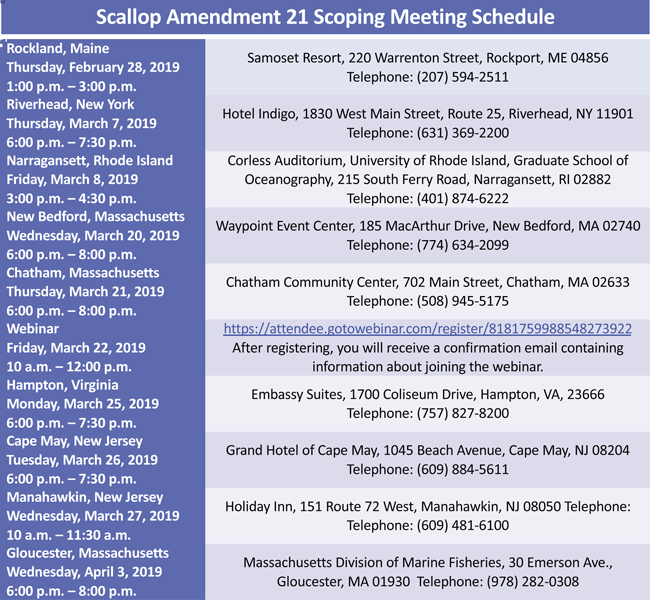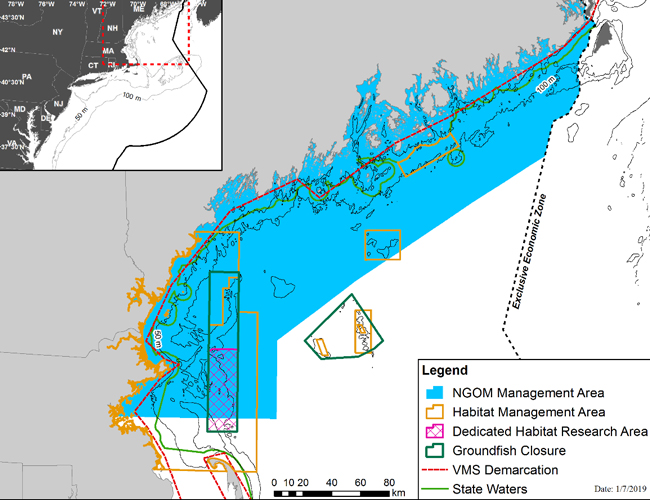Council to Hold 10 Scoping Meetings on Northern GOM, Limited Access General Category Scallop Amendment
The scallop fishery is
very diverse, and we
want this to be an
inclusive process.
The New England Fishery Management Council (NEFMC) has scheduled 10 scoping meetings from Maine to Virginia to gather public input on the development of Amendment 21 to the Atlantic Sea Scallop Fishery.
Management Plan
The amendment is being developed to address three primary issues:
• Northern Gulf of Maine (NGOM) Management Area measures;
• Limited Access General Category (LAGC) individual fishing quota (IFQ) possession limits;
• The ability for Limited Access vessels with LAGC IFQ to transfer their quota to vessels that only hold LAGC IFQ permits.
“The scallop fishery is very diverse, and we want this to be an inclusive process,” said Vincent Balzano, chairman of NEFMC’s Scallop Committee. “We’re traveling up and down the coast to give stakeholders a chance to learn about the amendment and provide input on the key issues they think the Council should address.”
The first scoping meeting will be held Thursday, Feb. 28, in Rockport, in conjunction with the annual Maine Fishermen’s Forum. The session will begin at 1 p.m. in the Camden Room at the Samoset Resort.
This is the first and best opportunity for members of
the public to raise issues
and concerns for the
Council to consider.
“Given that we’ll be talking about Northern Gulf of Maine issues in this amendment, we wanted fishermen in Midcoast and Downeast Maine to have easy access to one of our scoping meetings,” said Balzano. “Maine is a big state, and we know some fishermen have to drive for hours to get to a New England Council meeting. That’s why we’re hoping people will take advantage of the opportunity at the Maine Fishermen’s Forum to let us know what they’d like to see considered for the Northern Gulf of Maine and LAGC IFQ issues.”
NEFMC emphasized that attendance is highly encouraged at all of the scoping meetings.
“This is the first and best opportunity for members of the public to raise issues and concerns for the Council to consider during the development of Amendment 21,” NEFMC said in its scoping document. “Your comments early in the amendment development process will help the Council address your concerns more thoroughly and ensure that an adequate range of alternatives is considered.”
As an added convenience, NEFMC has scheduled a March 22 webinar to collect additional input.
Here are more details about the primary issues that will be discussed during the Amendment 21 scoping process.

Issue 1
Northern Gulf of Maine Management Area: The Council is planning to develop measures that will support a growing directed scallop fishery in federal waters in the Northern Gulf of Maine. To do so, Amendment 21 will consider measures that prevent unrestrained removals from the Northern Gulf of Maine Management Area and allow for orderly access to the scallop resource in this area by both the Limited Access General Category and the Limited Access components of the scallop fishery. This will include establishing mechanisms to set allowable catches and accurately monitor catch and bycatch.
Questions to Consider:
• What alternatives should the Council consider in Amendment 21 to change how the Limited Access and Limited Access General Category components of the federal scallop fishery operate in the Northern Gulf of Maine Management Area? Should the Council consider different approaches to managing this area at different levels of scallop biomass? What do you perceive the impacts of these changes to be?
• What specific issues are most important when evaluating the tradeoffs of developing additional measures in the Northern Gulf of Maine Management Area?
• Should the Council consider establishing a separate research set-aside from the NGOM total allowable catch (TAC) to support research and monitoring in the management area?
“Most of the boats that participated in the Northern Gulf of Maine fishery last year worked out of Gloucester, so we scheduled a scoping meeting there for April 3, which is after the area opens, to make it easier for fishermen to attend,” said Balzano.
The Northern Gulf of Maine Management Area is seen here in blue.
Courtesy New England Fishery Management Council.
Issue 2
Limited Access General Category Individual Fishing Quota Possession Limit: The Council is considering measures to increase the LAGC IFQ possession limit, which currently is 600 pounds.
Questions to Consider:
• If the Council modifies the LAGC IFQ trip limit, what should it change to?
• Should the trip limit be the same for open area and access area trips?
• Are there other approaches that the Council should consider, such as a weekly landings limit?
• What specific issues are most important when evaluating the tradeoffs of increasing the LAGC IFQ trip limit from 600 pounds?
Issue 3
One-Way Limited Access Quota Transfers to LACG IFQ Vessels: The Council will consider measures that allow Limited Access vessels to transfer IFQ to LAGC IFQ vessels.
Questions to Consider:
• Should the Council allow Limited Access vessels that qualified for LAGC IFQ to transfer quota to LAGC IFQ only vessels?
• Should the Council consider permanent and temporary transfers?
• How might this change impact the LAGC IFQ fishery?
• What specific issues are most important when evaluating the tradeoffs of allowing LA vessels to transfer IFQ to LAGC IFQ-only vessels?
The Council is considering Issues 2 and 3 for several reasons, including to:
o Improve overall economic performance of the LAGC IFQ component of the scallop fishery and ensure that it remains profitable;
o Ensure that there is continued participation in the General Category fishery at varying levels; and
o In order to accomplish this, consider approaches that aim to reduce the impacts on vessels and crews of: (1) decreases in the ex-vessel price of scallops; (2) increases to fixed costs, such as maintenance and repairs; and (3) increases in variable costs, such as trip expenses, including fuel, food, oil, ice, and water.
The Council is looking forward to hearing from fishermen and other stakeholders on these important issues. Here’s how you can help.
1. Attend a scoping hearing and provide oral information and feedback.
2. Submit written comments one of three ways:
• Fax: (978) 465-3116
• Email: comments@nefmc.org
• U.S. Postal Service.
The mailing address is:
Thomas A. Nies, Executive Director, New England Fishery Management Council, 50 Water Street, Mill #2, Newburyport, MA 01950.
All written comments should be received by April 15 and labeled as “Atlantic Sea Scallop Amendment 21 Scoping Comments.”
Questions? Contact Jonathon Peros, the Council’s scallop plan coordinator, at (978) 465-0492 ext. 117, jperos@nefmc.org.
Also, visit the Council’s Amendment 21 and Atlantic sea scallop webpages.

